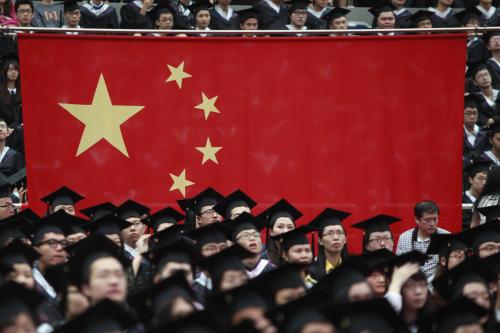Following is a speech given before the Brookings Council at the Hay Adams Hotel in Washington, DC.
The 20th century was, in the words of the iconic American publisher Henry Luce, the American century. By the 1980’s some were wondering whether American preeminence had come to an end, and books with names like “Japan as Number One” by my friend Ezra Vogel were best sellers. With Japan’s economic stagnation in the 1990’s, there was no further talk of Japan as number one.
In the last few years, with China’s rise, newspapers and casual conversations are full of ruminations about whether the 21st century will be China’s. It would be interesting to know what that most prominent of American patriots and China-watchers, Henry Luce, would have to say about this.
I do not propose to speculate about the likely comparative ebbs and flows of power among these three countries in the 21st century. It is almost certain that there will be dramatic changes in the fortunes of one, or all three, more than once, and one or more of the three may well look utterly different at some point than it does today.
What I do feel confident in asserting, however, is that the U.S., China, and Japan will be the three most important countries in determining the fate of the Asia-Pacific community in the 21st century. Will the Asia-Pacific be a zone of peace? Of prosperity? Of international cooperation in facing emerging challenges? Or will it be, as it was for most of the 20th century, a region of interstate and great power conflict? The relationships among these three countries will have more to do with answering these questions than any other factor.
One does not need a crystal ball to come to this conclusion. The facts are eloquent. The U.S. is the largest economy in the world. Japan is the second largest. China is the fourth largest, and will soon enter the ranks of the top three. The U.S. is the largest consumer of energy. China is the second largest. Japan is the third largest. The U.S. is the largest trading country in the world. Japan is the second largest. China is the third largest. The U.S. spends the most on the military of any country in the world. China is number two. Japan is number three or four. China has the most men and women under arms of any country in the world. The U.S. ranks number two (Japan numbers twenty-one).
There are no other countries in the Asia-Pacific region that will enter the ranks of the top three in terms of all these indices. Russia certainly is a military power that belongs in this grouping, and an energy producer, not a consumer, of world rank. But Russia is not yet a Pacific power in terms of trade and investment or indeed even in terms of its military power projection in the region. South Korea is arguably an incipient regional economic power that might deserve to be included in this grouping, and a united Korea, once the North is absorbed and modernized, could be a formidable factor. But Korea for the foreseeable future looks to be a country absorbed in itself and the considerable and daunting issues on the Korean peninsula, not one seeking to exercise regional influence.



Commentary
The Dynamics of Change among China, Japan and the U.S.
October 3, 2007